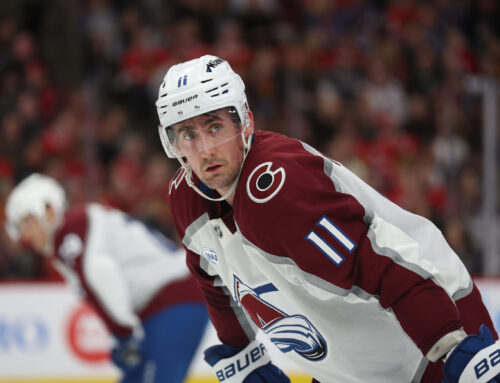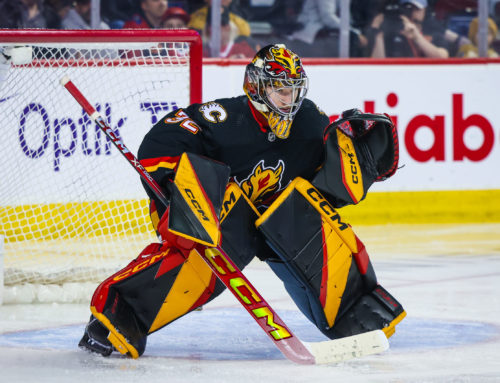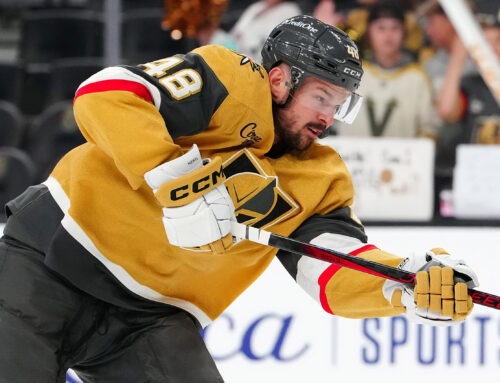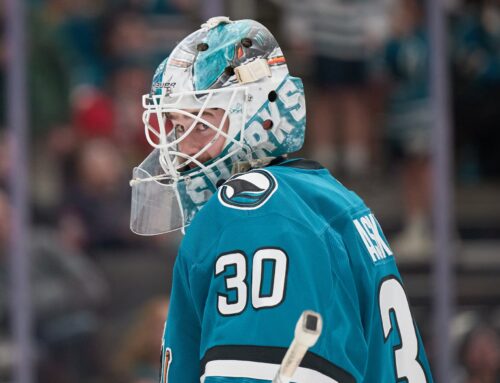
Following the draft lottery, we’ve been examining each Western Conference squad’s offseason priorities, emphasizing points-only pool production with some peripheral considerations and highlighting potential breakout candidates. We started in the cellar points-wise and are moving up as we go. We’ll tackle Vegas shortly after the June expansion draft. Last week was St. Louis and Edmonton. This week we’ll continue looking at playoff teams with Anaheim and Minnesota – likely the two existing squads most impacted by next week’s expansion draft.
Anaheim Ducks – 46-23-13 (105 points)
Western Conference Finals loss to Nashville
Greatest needs: forward depth, scoring, losing as little as possible to Vegas
If you’ve kept track of the Ducks’ challenges surrounding the expansion draft you know they stand to lose a good player. Through various means, defensemen Josh Manson, Sami Vatanen, or right winger Jakob Silfverberg could depart for Vegas without compensation. Many expect them to alleviate the problem by swapping a defenseman for a forward, with Toronto’s James van Riemsdyk frequently mentioned. They could instead make an un-fun deal with Vegas to lay off their most valuable unprotected assets. We’ll know next week, but expect some movement.
This is their first domino, but the blue line is very deep even if they lose one to expansion, including high-grade prospects/graduates assuming increased roles. Cam Fowler, Vatanen, Manson (third among West d-men with 227 hits, fourth in PIM with 82), Hampus Lindholm, and buyout candidate Kevin Bieksa are supported by Shea Theodore and Brandon Montour.
Finishing second and third respectively for Anaheim in playoff rearguard scoring, both Theodore and Montour are more than ready to take another step forward. The 2015 first-rounder Jacob Larsson is also on the verge after making the Ducks out of camp last fall. With these three looking at increased playing time in 2017-18, pick up any available or reasonably-priced.
Fowler was tops production-wise with a Duck defenseman-high 39 points (11 G, 28 A, 15 PPP) adding two goals and seven assists in 13 postseason contests. Entering a contract campaign, at 25, the seven-year vet could be in for even bigger things.
Who knows where Vatanen will land and when he’ll start playing, but his 24 points was second behind Fowler albeit off his previous 37 and 38-point campaigns. Recent shoulder surgery keeping him out at least the first few months won’t help his trade value or totals, but may yield a fantasy bargain if you’re willing to wait out the recovery. Particularly if he ends up with a high-scoring club. Healing a repaired shoulder as well, Lindholm, usually good for about 30 points but dropping to 20 in 2017-18, will also miss the beginning of the year. Thus, Theodore, Montour, and maybe Larsson could gain extra minutes.
The Ducks have a top-heavy bunch of forwards, salary and scoring-wise, and just $1.67M in cap space prior to expansion shenanigans. With Patrick Eaves an unrestricted free agent likely getting a bigger pay day elsewhere, GM Bob Murray needs to get crafty to add to Corey Perry ($8.625M), Ryan Getzlaf ($8.25M) and Ryan Kesler ($6.875M), all with no-movement clauses, and Rickard Rakell after his Duck-high 33 goals (10 GWG to lead the league) and 51-point campaign.
Partially a function of their game plan, Anaheim ranked 18th in goals (220), 17th on power play success (18.7%), and 23rd in shots (29.6 per contest), and would do well do hold on to Silfverberg’s 23 goals, 26 assists, and team-high 227 shots. A possible Vatanen or Manson trade currently seems the best avenue to bolster scoring among their forward ranks, along with iron man Andrew Cogliano (35 points) and face-off king Antoine Vermette (62.3%) should neither move to Vegas.
Prospects Sam Steel (131 points in 66 WHL games last campaign) and Max Jones’ point-per-game production in the OHL loom. Both are recommended dynasty pick-ups, but not yet NHL-ready. Nick Ritchie could see added ice time and scoring (14 goals, 14 assists, 12:59 TOI in 2016-17) along with solid peripherals (247 hits – best in the West for forwards).
After an effective (25-16-9, 2.22, .924) but again injury-marred campaign, John Gibson will be highly sought in pools. His save percentage was best in the West among netminders playing at least 35 contests, and goals-against only behind Peter Budaj’s 2.12. While he had some rough postseason play, back-up Jonathan Bernier was outstanding as a late-year replacement, finishing 21-7-4, 2.50 and .915, and unless drastic changes occur will net more than the Ducks can afford as a UFA. With Jhonas Enroth also unrestricted, Anaheim will seek a number two to the young, talented, injury-prone Gibson. Whomever that is may warrant a late-round or cheap trade flier.
Minnesota Wild – 49-25-8 (106 points)
First round playoff series loss to St. Louis
Greatest needs: big-time scorer, back-up goalie, losing as little as possible to Vegas
Like Anaheim, the Wild has much at stake with expansion. Despite their again disappointing postseason, depth at forward and defense will cost Minnesota, uncompensated, a key piece of their present and future unless they deal wisely. You can replace the Duck names above with defensemen Matt Dumba and Jonas Brodin, and wingers Mikael Granlund, Jason Zucker and Nino Niederreiter as potential casualties. With a rich stew of deal scenarios and pre-draft suitors, anticipate movement soon.
Their forwards are ridiculously deep. Pre-Vegas, Minnesota has eight regularly-used ones eligible for the draft and three other RFAs including their top and fourth-best scorers. Three have no-movement clauses: Zach Parise, Mikko Koivu, and pricey buyout contender Jason Pominville. The other five include Eric Staal’s team-leading 28 goals and 65 points, Charlie Coyle’s 57, and Vegas-raised Jason Zucker coming off career scoring highs with 22 goals and 25 assists.
Granlund or Niederreiter can’t leave for free. Granlund far surpassed career highs with 26 goals, 43 assists and 69 points, leading last year’s Wild in assists and points. Niederreiter’s 25 goals (a career high) was third-best, and his eight power play goals led Minnesota with Granlund’s seven placing second. He also tallied career bests with 32 assists and 57 points, and led the squad with 120 hits.
For all these reasons, in spite of expansion-related changes, the Wild can roll plentiful lines with scoring threats but no superstar-type fear-generators. During their playoff meltdown, and regardless of their NHL second-best 3.2 goals-per-game over the regular schedule, they needed a true difference-maker to step up. With almost $11.5M in cap space (we’ll see how much is left if Granlund and Niederreiter extend) and prospectively shrewd dealing bringing more, they might target UFA T.J. Oshie or exchange a forward and/or defenseman at risk for a high-profile scorer.
With so many moving parts it’s tough at this juncture to forecast fantasy breakouts and regressive flubs. We’ll know a great deal more after the expansion and entry drafts and project accordingly.
The same holds on the back end. Minnesota must lock down the max seven forwards in the expansion draft, meaning they can protect three defensemen. Top pairing Ryan Suter (with a NMC) and Jared Spurgeon will stay.
The third will be Brodin or Dumba with the one not protected likely dealt. Arguably, former first-rounder Dumba, following a career-high 34 points and 20:20 average TOI, as well as manning the Wild’s top power play unit most frequently with Suter, carries more value. He could bring much in a pre-Vegas deal. If that doesn’t happen, the talented defensive difference-maker Brodin, who saw his point total climb to 25 last year, will go. Boston is the hot rumor as part of a package fetching Ryan Spooner and a first round pick.
Their final destinations – whether Vegas, Boston, Minnesota on a slightly-thinned blue line, or elsewhere, will have strong fantasy implications. Let’s see what happens and recalibrate.
Netminder Devan Dubnyk needs help. While his ultimate 2.25 goals-against was among the best, his pre-All-Star break 1.88 GAA makes us think how much better things could have been. Backup Darcy Keumper (a UFA) wasn’t the answer with an 8-5-3, 3.13, .902 line that necessitated 65 Dubnyk starts. Envision what bringing that number down to the mid-50s, with the support of a Bernier or other capable replacement, could do for poolies with a further reduced goals-against average and solid save percentage.
Follow me on Twitter @KWcrosscheck





 TOR
TOR FLA
FLA CAR
CAR STL
STL MIN
MIN WSH
WSH EDM
EDM ANA
ANA N.J
N.J
